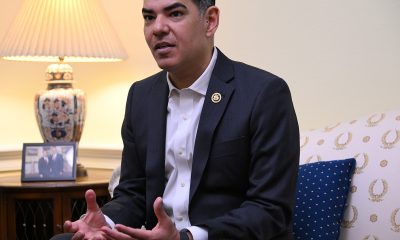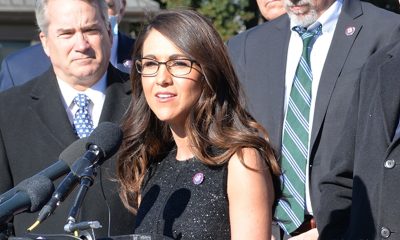National
Legal challenge to ‘Don’t Ask’ goes to court
Two-week trial to feature discharged service members

Another avenue for ending “Don’t Ask, Don’t Tell” will open up next week with the start of a trial over the constitutionality of the ban preventing openly gay, lesbian and bisexual people from serving in the U.S. armed forces.
On Tuesday, the U.S. District Court in the Central District of California will begin to hear testimony in what’s expected to be a two-week long trial in the case of Log Cabin v. United States. Presiding over the trial will be U.S. District Court Judge Virginia Phillips.
The case challenges the constitutionality of “Don’t Ask, Don’t Tell” on the basis that it violates the due process and freedom of speech rights of openly LGBT service members.
R. Clarke Cooper, executive director of the Log Cabin Republicans, said his organization is pursuing the lawsuit — initially filed in 2004 — as part of an effort to “conduct multiple operations to achieve victory” in ending “Don’t Ask, Don’t Tell” as with a military campaign.
“We are lobbying Republican members of Congress, have an active court case going to trial next week and are consulting with the Department of Defense,” he said.
The case is reaching its trial at the same time legislation is advancing through Congress that could put an end to “Don’t Ask, Don’t Tell.”
Phillips agreed last week to hold the trial. The lawsuit is proceeding despite multiple requests to stay the case from the Obama administration, which is defending “Don’t Ask, Don’t Tell” in court.
Representing Log Cabin during the trial is Dan Woods, an attorney for White & Case LLP. He said his plan involves presenting a variety of evidence.
“It is evident from the evidence we’re going to put on that it is applied selectively, it is applied more in times of peace than in times of war,” Woods said. “It is quite clearly the case that most other countries with militaries comparable to ours allow homosexuals to serve and have no problems with lifting bans on homosexuals serving.”
Woods said seven expert witnesses at the trial will offer different perspectives on the harm that “Don’t Ask, Don’t Tell” has caused.
Among those who are set to testify are Aaron Belkin, director of the Palm Center, a think-tank on gays in the military, and Nathaniel Frank, a former senior fellow at the Palm Center who’s now the senior strategist at the LGBT Movement Advancement Project. Both declined to comment for this article.
Woods also said five service members discharged under “Don’t Ask, Don’t Tell” will offer testimony during the trial.
“The thrust of their testimony is not that they individually were unfairly discharged, but that their discharges had nothing to do with their performance or nothing to do with the so-called purposes of ‘Don’t Ask, Don’t Tell,’” he said.
Among the former service members slated to testify is Alex Nicholson, executive director of Servicemebers United and a gay former linguist for the U.S. Army who was discharged in 2002 under “Don’t Ask, Don’t Tell.”
Nicholson, who’s named as one of the parties in the lawsuit, said the trial has been thus far “unusually successful” and noted that the administration’s attempts “to derail the case have so far failed.”
“Because of my public role as a party to this case, my testimony will likely focus on the factors that make me eligible to bring a cause of action challenging this law, including how this law has harmed me personally,” he said.
Also set to offer testimony during the trial is Mike Almy, a gay former Air Force communications officer who was discharged in 2006 and testified before the Senate on the issue.
Almy said Log Cabin had asked him to be a witness during the trial, but noted that he didn’t want to comment on the specifics of the case before the trial begins.
“I’m honored to help tear down this law that has ruined tens of thousands of careers and weakened our national security,” he said. “It is past time our nation catch up with the dozens of other nations that have lifted their bans on gays and lesbians serving openly in the military.”
Woods said other evidence that the plaintiffs will submit includes statements from President Obama saying the law weakens national security.
Assistant U.S. Attorney Paul Freeborne will represent the Obama administration in court. Woods said he was told the administration won’t present any witnesses during the trial or any evidence other than the congressional testimony leading to the enactment of “Don’t Ask, Don’t Tell” in 1993.
A spokesperson from the Justice Department deferred to the administration’s earlier filings in the case in response to a Blade inquiry about how the administration will defend “Don’t Ask, Don’t Tell” in court.
Woods said he’s “optimistic” that the plaintiffs in the case “will do well and win” the lawsuit. He noted Phillips determined that the heightened scrutiny from the U.S. Ninth Circuit Court of Appeals ruling in Witt v. Air Force in 2008 would apply in the case.
Woods said the application of this precedent will “have a major impact” on the case because the government would have to show it’s advancing an important interest with “Don’t Ask, Don’t Tell.”
Additionally, he said the administration would have to prove the intrusion of “Don’t Ask, Don’t Tell” on LGBT people furthers that interest and is necessary for that interest.
“I don’t think the government can prove that and I think we can show that the government cannot meet that standard by the evidence we intend to put on,” he said.
Despite his optimism, Woods said he couldn’t offer a timeline for how long the case would need to proceed. He noted that Phillips will need to take “a little while” to write up her ruling following the completion of the trial.
“If we do win, we’re going to ask to declare this law unconstitutional and to enjoin the government from enforcing it ever again,” Woods said.
Federal Government
HHS to retire 988 crisis lifeline for LGBTQ youth
Trevor Project warns the move will ‘put their lives at risk’

The U.S. Department of Health and Human Services is planning to retire the national 988 crisis lifeline for LGBTQ youth on Oct. 1, according to a preliminary budget document obtained by the Washington Post.
Introduced during the Biden-Harris administration in 2022, the hotline connects callers with counselors who are trained to work with this population, who are four times likelier to attempt suicide than their cisgender or heterosexual counterparts.
“Suicide prevention is about risk, not identity,” said Jaymes Black, CEO of the Trevor Project, which provides emergency crisis support for LGBTQ youth and has contracted with HHS to take calls routed through 988.
“Ending the 988 Suicide and Crisis Lifeline’s LGBTQ+ youth specialized services will not just strip away access from millions of LGBTQ+ kids and teens — it will put their lives at risk,” they said in a statement. “These programs were implemented to address a proven, unprecedented, and ongoing mental health crisis among our nation’s young people with strong bipartisan support in Congress and signed into law by President Trump himself.”
“I want to be clear to all LGBTQ+ young people: This news, while upsetting, is not final,” Black said. “And regardless of federal funding shifts, the Trevor Project remains available 24/7 for anyone who needs us, just as we always have.”
The service for LGBTQ youth has received 1.3 million calls, texts, or chats since its debut, with an average of 2,100 contacts per day in February.
“I worry deeply that we will see more LGBTQ young people reach a crisis state and not have anyone there to help them through that,” said Janson Wu, director of advocacy and government affairs at the Trevor Project. “I worry that LGBTQ young people will reach out to 988 and not receive a compassionate and welcoming voice on the other end — and that will only deepen their crisis.”
Under Trump’s HHS secretary, Robert F. Kennedy, Jr., the agency’s departments and divisions have experienced drastic cuts, with a planned reduction in force of 20,000 full-time employees. The Substance Abuse and Mental Health Services Administration has been sunset and mental health services consolidated into the newly formed Administration for a Healthy America.
The budget document reveals, per Mother Jones, “further sweeping cuts to HHS, including a 40 percent budget cut to the National Institutes of Health; elimination of funding for Head Start, the early childhood education program for low-income families; and a 44 percent funding cut to the Centers for Disease Control, including all the agency’s chronic disease programs.”
U.S. Supreme Court
Supreme Court hears oral arguments in LGBTQ education case
Mahmoud v. Taylor plaintiffs argue for right to opt-out of LGBTQ inclusive lessons

The U.S. Supreme Court on Tuesday heard oral arguments in Mahmoud v. Taylor, a case about whether Montgomery County, Md., public schools violated the First Amendment rights of parents by not providing them an opportunity to opt their children out of reading storybooks that were part of an LGBTQ-inclusive literacy curriculum.
The school district voted in early 2022 to allow books featuring LGBTQ characters in elementary school language arts classes. When the county announced that parents would not be able to excuse their kids from these lessons, they sued on the grounds that their freedom to exercise the teachings of their Muslim, Jewish, and Christian faiths had been infringed.
The lower federal courts declined to compel the district to temporarily provide advance notice and an opportunity to opt-out of the LGBTQ inclusive curricula, and the 4th U.S. Circuit Court of Appeals determined that the parents had not shown that exposure to the storybooks compelled them to violate their religion.
“LGBTQ+ stories matter,” Human Rights Campaign President Kelley Robinson said in a statement Tuesday. “They matter so students can see themselves and their families in the books they read — so they can know they’re not alone. And they matter for all students who need to learn about the world around them and understand that while we may all be different, we all deserve to be valued and loved.”
She added, “All students lose when we limit what they can learn, what they can read, and what their teachers can say. The Supreme Court should reject this attempt to silence our educators and ban our stories.”
GLAD Law, NCLR, Family Equality, and COLAGE submitted a 40-page amicus brief on April 9, which argued the storybooks “fit squarely” within the district’s language arts curriculum, the petitioners challenging the materials incorrectly characterized them as “specialized curriculum,” and that their request for a “mandated notice-and-opt-out requirement” threatens “to sweep far more broadly.”
Lambda Legal, the Leadership Conference on Civil and Human Rights, PFLAG, and the National Women’s Law Center announced their submission of a 31-page amicus brief in a press release on April 11.
“All students benefit from a school climate that promotes acceptance and respect,” said Karen Loewy, senior counsel and director of constitutional law practice at Lambda Legal. “Ensuring that students can see themselves in the curriculum and learn about students who are different is critical for creating a positive school environment. This is particularly crucial for LGBTQ+ students and students with LGBTQ+ family members who already face unique challenges.”
The organizations’ brief cited extensive social science research pointing to the benefits of LGBTQ-inclusive instruction like “age-appropriate storybooks featuring diverse families and identities” benefits all students regardless of their identities.
Also weighing in with amici briefs on behalf of Montgomery County Public Schools were the National Education Association, the ACLU, and the American Psychological Association.
Those writing in support of the parents challenging the district’s policy included the Center for American Liberty, the Manhattan Institute, Parents Defending Education, the Alliance Defending Freedom, the Trump-Vance administration’s U.S. Department of Justice, and a coalition of Republican members of Congress.
U.S. Supreme Court
LGBTQ groups: SCOTUS case threatens coverage of preventative services beyond PrEP
Kennedy v. Braidwood oral arguments heard Monday

Following Monday’s oral arguments before the U.S. Supreme Court in Kennedy v. Braidwood Management, Inc., LGBTQ groups issued statements warning the case could imperil coverage for a broad swath of preventative services and medications beyond PrEP, which is used to reduce the risk of transmitting HIV through sex.
Plaintiffs brought the case to challenge a requirement that insurers and group health plans cover the drug regimen, arguing that the mandate “encourage[s] homosexual behavior, intravenous drug use, and sexual activity outside of marriage between one man and one woman.”
The case has been broadened, however, such that cancer screenings, heart disease medications, medications for infants, and several other preventive care services are in jeopardy, according to a press release that GLAAD, Lambda Legal, PrEP4All, Harvard Law’s Center for Health Law and Policy Innovation (CHLPI), and the Center for HIV Law and Policy (CHLP) released on Monday.
The Trump-Vance administration has argued the independent task force responsible for recommending which preventative services must be covered with no cost-sharing for patients is constitutional because the secretary of the U.S. Department of Health and Human Services can exercise veto power and fire members of the volunteer panel of national experts in disease prevention and evidence-based medicine.
While HHS secretaries have not exercised these powers since the Affordable Care Act was passed in 2010, Braidwood could mean Trump’s health secretary, Robert F. Kennedy Jr., takes a leading role in determining which services are included in the coverage mandate.
Roll Call notes the Supreme Court case comes as the administration has suspended grants to organizations that provide care for and research HIV while the ongoing restructuring of HHS has raised questions about whether the “Ending the HIV Epidemic” begun under Trump’s first term will be continued.
“Today’s Supreme Court hearing in the Braidwood case is a pivotal moment for the health and rights of all Americans,” said GLAAD President Sarah Kate Ellis. “This case, rooted in discriminatory objections to medical necessities like PrEP, can undermine efforts to end the HIV epidemic and also jeopardize access to essential services like cancer screenings and heart disease medications, disproportionately affecting LGBTQ people and communities of color.”
She added, “Religious exemptions should not be weaponized to erode healthcare protections and restrict medically necessary, life-saving preventative healthcare for every American.”
Lambda Legal HIV Project Director Jose Abrigo said, “The Braidwood case is about whether science or politics will guide our nation’s public health policy. Allowing ideological or religious objections to override scientific consensus would set a dangerous precedent. Although this case began with an attack on PrEP coverage, a critical HIV prevention tool, it would be a serious mistake to think this only affects LGBTQ people.”
“The real target is one of the pillars of the Affordable Care Act: The preventive services protections,” Abrigo said. “That includes cancer screenings, heart disease prevention, diabetes testing, and more. If the plaintiffs succeed, the consequences will be felt across every community in this country, by anyone who relies on preventive care to stay healthy.”
He continued, “What’s at stake is whether we will uphold the promise of affordable and accessible health care for all or allow a small group of ideologues to dismantle it for everyone. We as a country are only as healthy as our neighbors and an attack on one group’s rights is an attack on all.”
PrEP4All Executive Director Jeremiah Johnson said, “We are hopeful that the justices will maintain ACA protections for PrEP and other preventive services, however, advocates are poised to fight for access no matter the outcome.”
He continued, “Implementing cost-sharing would have an enormous impact on all Americans, including LGBTQ+ individuals. Over 150 million people could suddenly find themselves having to dig deep into already strained household budgets to pay for care that they had previously received for free. Even small amounts of cost sharing lead to drops in access to preventive services.”
“For PrEP, just a $10 increase in the cost of medication doubled PrEP abandonment rates in a 2024 modeling study,” Johnson said. “Loss of PrEP access would be devastating with so much recent progress in reining in new HIV infections in the U.S. This would also be a particularly disappointing time to lose comprehensive coverage for PrEP with a once every six month injectable version set to be approved this summer.”
“Today’s oral arguments in the Braidwood case underscore what is at stake for the health and well-being of millions of Americans,” said CHLPI Clinical Fellow Anu Dairkee. “This case is not just about legal technicalities — it is about whether people across the country will continue to have access to the preventive health services they need, without cost sharing, regardless of who they are or where they come from.”
She continued, “Since the Affordable Care Act’s preventive services provision took effect in 2010, Americans have benefited from a dramatic increase in the use of services that detect disease early, promote healthy living, and reduce long-term health costs. These benefits are rooted in the work of leading scientists and public health experts, including the U.S. Preventive Services Task Force, whose recommendations are based on rigorous, peer-reviewed evidence.”
“Any shift away from cost-free access to preventive care could have wide-ranging implications, potentially limiting access for those who are already navigating economic hardship and health disparities,” Dairkee said. “If Braidwood prevails, the consequences will be felt nationwide. We risk losing access to lifesaving screenings and preventive treatments that have become standard care over the past decade.”
“This case should serve as a wake-up call: Science, not politics, must guide our health care system,” she said. “The health of our nation depends on it.”
“We are grateful for the Justices who steadfastly centered constitutionality and didn’t allow a deadly political agenda to deter them from their job at hand,” said CHLP Staff Attorney Kae Greenberg. “While we won’t know the final decision until June, what we do know now is not having access to a full range of preventative healthcare is deadly for all of us, especially those who live at the intersections of racial, gender and economic injustice.”
“We are crystal clear how the efforts to undermine the ACA, of which this is a very clear attempt, fit part and parcel into an overall agenda to rollback so much of the ways our communities access dignity and justice,” he said. “Although the plaintiffs’ arguments today were cloaked in esoteric legal language, at it’s heart, this case revolves around the Christian Right’s objection to ‘supporting’ those who they do not agree with, and is simply going to result in people dying who would otherwise have lived long lives.”
“This is why CHLP is invested and continues in advocacy with our partners, many of whom are included here,” Greenberg said.
-

 Federal Government2 days ago
Federal Government2 days agoHHS to retire 988 crisis lifeline for LGBTQ youth
-

 Opinions2 days ago
Opinions2 days agoDavid Hogg’s arrogant, self-indulgent stunt
-

 District of Columbia2 days ago
District of Columbia2 days agoD.C. police seek help in identifying suspect in anti-gay threats case
-

 Opinions1 day ago
Opinions1 day agoOn Pope Francis, Opus Dei and ongoing religious intolerance












